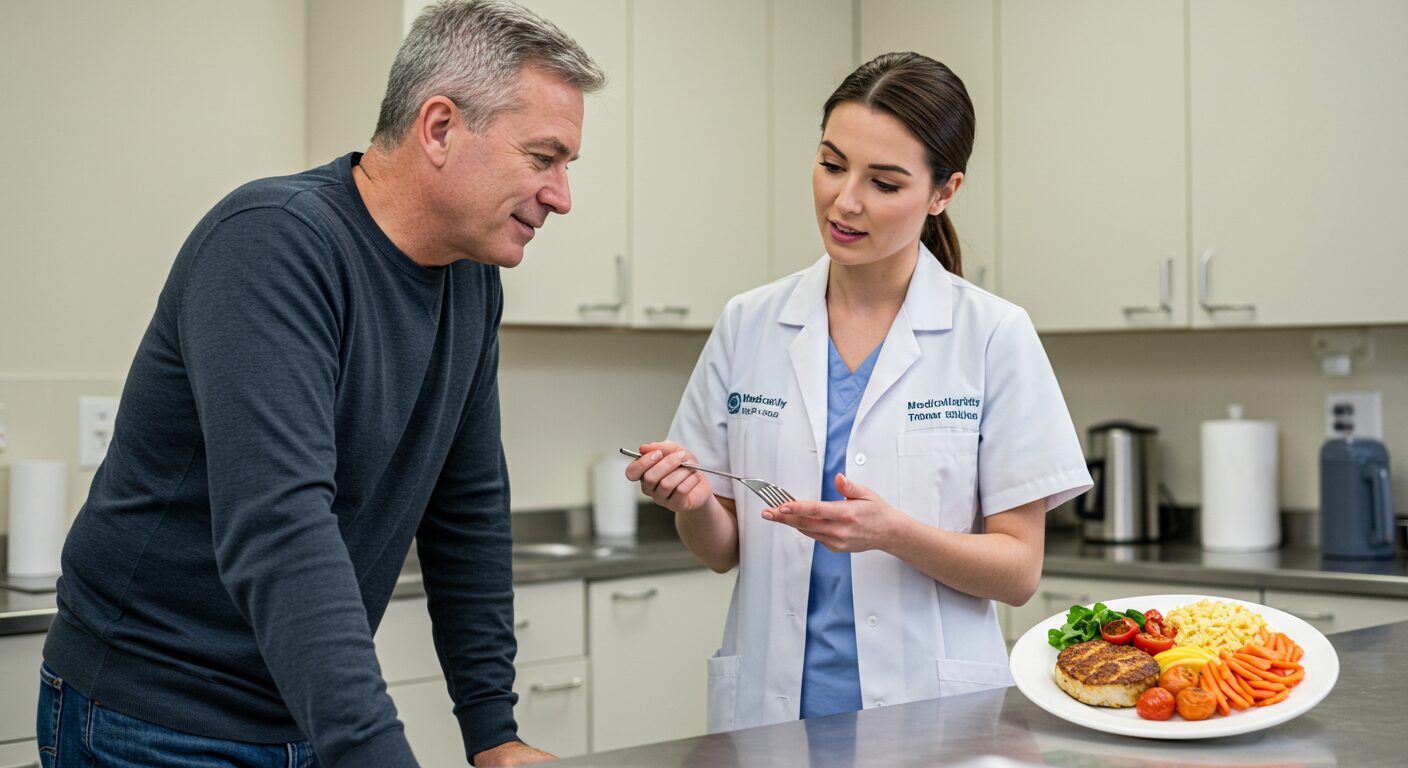Key Selection Criteria
Start by outlining your therapeutic goals—whether it’s managing blood sugar, reducing inflammation, or supporting renal health—and match these against providers’ disease-specific expertise. Develop a comparison matrix listing factors such as meal variety, customization options, delivery frequency, and technology integration to objectively weigh pros and cons. This structured framework clarifies priorities and highlights differentiators between programs.
Involve your healthcare team: ask physicians for trusted referrals, consult registered dietitians on clinical protocols, and read patient testimonials for real-world insights. And don’t forget personal preferences—flavor profiles, cultural dishes, and convenience considerations all influence long-term adherence. Engaging multiple perspectives ensures you select a program that meets both medical and lifestyle needs.
Additional Consideration: Evaluate providers’ research and innovation track records. Those publishing outcomes data or participating in clinical trials demonstrate a commitment to continuous improvement, ensuring your meals remain aligned with evolving best practices. Prioritizing evidence-backed providers reduces uncertainty and maximizes the potential for positive health outcomes.
Clinical Oversight and Accreditation
Verify that meal plans are designed and reviewed by licensed medical professionals—physicians and registered dietitians—who specialize in chronic disease management. Accreditation from bodies like the Academy of Nutrition and Dietetics or the Meal Certification Institute indicates adherence to rigorous clinical and food safety standards. Accreditation status also reflects a provider’s investment in ongoing staff education and process evaluation.
Request audit schedules, readmission-reduction metrics, and published outcome reports. Providers that openly share third-party audit results and accreditation documentation demonstrate transparency and clinical excellence. This level of accountability underscores their commitment to patient safety and continuous quality improvement. Medically Tailored Meals Requirements
Continuous Quality Improvement: Leading programs engage in regular staff education, update protocols based on the latest research, and use patient feedback to refine clinical pathways, ensuring you receive cutting-edge nutrition therapy. These iterative enhancements not only improve health outcomes but also foster trust and loyalty among patients.
Culinary and Nutrition Expertise
Strong providers foster ongoing collaboration between chefs and dietitians to translate clinical prescriptions into culinary masterpieces. Regular taste-test sessions, recipe iterations, and texture modifications prevent menu fatigue and keep meals enjoyable. By combining flavor science with medical nutrition therapy, these programs deliver both satisfaction and therapeutic benefit.
Look for programs that document chef credentials, training modules, and R&D processes for menu innovation. This demonstrates a systematic approach to balancing therapeutic targets with patient satisfaction. Transparent chef-dietitian workflows ensure that culinary creativity never compromises clinical precision.
Innovation & Testing: Some providers maintain test kitchens for pilot recipes, collect sensory data, and run A/B taste experiments. These practices highlight a scientific approach to flavor optimization, boosting both health outcomes and meal adherence. Understanding a provider’s R&D investment reveals how seriously they take patient experience. What Are Medically Tailored Meals?
Ingredient Sourcing and Traceability
Transparent sourcing begins with partnerships with regenerative farms practicing minimal pesticide use, soil health preservation, and fair labor practices. Top providers implement traceability platforms—often blockchain-based—tracking each ingredient from harvest to plate. This level of oversight guarantees ingredient integrity and fosters sustainability in the food system.
Ask for sample traceability reports showing origin, harvest date, and handling methods. Providers that detail co-op partnerships, seasonal sourcing strategies, and sustainability certifications demonstrate accountability and environmental stewardship. Access to this data empowers patients to make informed food choices and supports ethical consumption.
Sustainability Focus: Beyond transparency, evaluate providers’ commitments to reducing carbon footprints, such as local sourcing, recyclable packaging, and waste-minimization programs. Choosing an eco-conscious provider amplifies health benefits by supporting broader food system improvements. These initiatives align personal wellness with planetary health.
Coverage, Cost, and Insurance Partnerships
Understand pricing models—subscription tiers, add-on services, and per-meal fees—before committing. Determine whether providers partner with Medicaid waivers, Medicare Advantage plans, or private insurers to minimize out-of-pocket costs. Clear cost breakdowns prevent billing surprises and enable budgeting for long-term care.
Engage care coordination teams to verify benefits, assist with claims submission, and explore FSA/HSA reimbursement options. Transparency in billing avoids surprises and builds trust. Financial clarity encourages sustained participation and reduces stress associated with healthcare expenses.
Financial Assistance & Flexibility: Many providers offer sliding scale fees, hardship scholarships, or payment plans for patients facing coverage gaps. Ask about discounts for longer commitments, caregiver bundles, or community programs to maximize value. Accessible payment options underscore a provider’s commitment to inclusivity. Who Provides Medically Tailored Meals?
Patient Support and Education Services
Comprehensive programs extend beyond meal delivery, offering telehealth check-ins, nutrition education webinars, and peer support groups. These resources reinforce dietary behavior change and help troubleshoot logistical or health-related issues. Engaging education modalities equip patients with the skills needed for long-term success.
Evaluate communication channels—24/7 hotlines, app-based chat, or dedicated dietitian callbacks—and frequency of follow-ups. Active patient engagement correlates with higher adherence and satisfaction. A responsive support team bridges gaps between deliveries and clinical care.
Community & Accountability: Top providers host virtual or in-person workshops, cooking demonstrations, and social events that foster community, accountability, and shared learning—critical components for sustainable lifestyle changes. Building a network of peers strengthens motivation and resilience throughout the nutrition journey.
Why Choose Wholesome Grub?
Wholesome Grub merges culinary excellence with clinical rigor, creating chef-curated meals designed by registered dietitians and overseen by physicians. Their “Food is Medicine” philosophy means each menu is handcrafted to support chronic disease management and optimize wellness. The integration of personalized coaching and behavior-change modules elevates meal delivery into a holistic health program.
Meals are never frozen, air-packed, or preserved—arriving fresh and nutrient-dense with a 5–7 day freshness scale. Local partnerships with regenerative farms ensure traceable, pesticide-minimal ingredients. Weekly meal rotations and customizable flavor profiles accommodate individual preferences and seasonal produce. The company’s tactile packing design also minimizes waste and enhances convenience.
Wholesome Grub further offers personalized wellness programs—like their Longevity Package and Women’s Wellness coaching—that integrate genotype-based insights, wearable device tracking, and behavior-change support. Discount tiers and flexible subscription options make premium, tailored nutrition accessible for diverse budgets. The addition of one-on-one dietitian consultations and community challenges fosters sustained engagement and accountability.
Conclusion
Choosing a medically tailored meals provider requires balancing clinical oversight, culinary innovation, sourcing transparency, cost considerations, and patient support. Wholesome Grub exemplifies these best practices, delivering fresh, personalized nutrition that truly functions as medicine. By evaluating providers against the criteria above, you’ll secure a partner committed to your health journey and long-term well-being.



